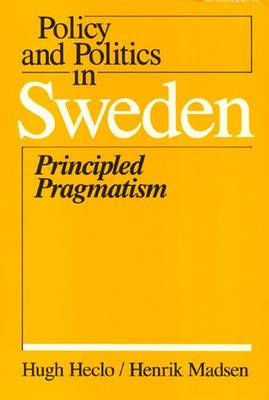Policy & Politics in Industrial States
1 total work
Sweden is a country of paradoxes. Renowned for its liberal social welfare programs and pluralistic cooperation, its government is also characterized by rigid and highly structured behaviour. In this volume of the "Policy and Politics" series, Hugh Heclo and Henrik Madsen explore the contradictions that Sweden represents, its unique blend of innovation and conservatism, and the qualities that define 'The Swedish Way'. In describing the workings of the Swedish government, several factors must be considered: social democratic hegemony, structured consultation, and corporate representation. Respectively these terms refer to the predominant leadership and ideology of the Social Democratic party, the ritualistic forms of representing all factions, and the organized representation of any social group with an individual interest.Heclo and Madsen examine what they call 'The Swedish Way' and analyse how these attributes fit into policymaking behaviour. Characterizing the Swedes as intensely private, the authors contrast American emphasis upon individual achievement with Swedish approval of group-oriented behaviour.
That factor together with the ethnic and cultural homogeneity of the people reduces the potential for conflict in the political realm. The Swedes also typically adopt a problem-focused approach whenever dealing with public or private sector policy and administration. The practical result of pursuing the welfare vision by means of a problem-focused approach is that problems of collective choice what the government should do to move Swedish society in the 'right' direction preoccupy the political system.Thus policymaking is in a state of constant adjustment. In this discussion of pioneering reforms, controlled conflict, and specific examples of policy formation and implementation, Heclo and Madsen explain the celebrated but paradoxical political system of Sweden. Author note: Hugh Heclo is Professor of Government at Harvard University. Henrik Madsen is a management consultant for McKinsey & Co., Copenhagen.
That factor together with the ethnic and cultural homogeneity of the people reduces the potential for conflict in the political realm. The Swedes also typically adopt a problem-focused approach whenever dealing with public or private sector policy and administration. The practical result of pursuing the welfare vision by means of a problem-focused approach is that problems of collective choice what the government should do to move Swedish society in the 'right' direction preoccupy the political system.Thus policymaking is in a state of constant adjustment. In this discussion of pioneering reforms, controlled conflict, and specific examples of policy formation and implementation, Heclo and Madsen explain the celebrated but paradoxical political system of Sweden. Author note: Hugh Heclo is Professor of Government at Harvard University. Henrik Madsen is a management consultant for McKinsey & Co., Copenhagen.
